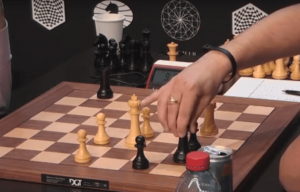 There was an absolutely fascinating incident at the 2016 Candidates Chess Tournament being held in Moscow, Russia. The top U.S. player in the world, Hikaru Nakamura, touched his king but decided against moving it.
There was an absolutely fascinating incident at the 2016 Candidates Chess Tournament being held in Moscow, Russia. The top U.S. player in the world, Hikaru Nakamura, touched his king but decided against moving it.
There is a rule in chess that if you touch a particular piece you must then move that piece to another square as your next move. The rule is clear. You can adjust your piece without intending to move it, if you tell your opponent of your intention beforehand. This rule is well-known by all the players at such a prestigious tournament and was one of the first rules of chess taught to me when I was a child.
It happened at a crucial moment in the game and Nakamura touched a piece that if moved would almost certainly cause him to lose the game. He had to move another piece in order to achieve a draw.
It’s not so much the incident that I find fascinating as its immediate aftermath. Nakamura’s opponent, Levon Aronian, immediately called Nakamura on the touch. Nakamura’s reaction was just as quick. He claimed that he was adjusting the piece. Aronian didn’t believe it for a moment and called over an arbitrator who agreed with the Armenian. Nakamura then had to move the king, did so, and soon after lost the game.
It is clear from the video that Nakamura was in no way adjusting the piece. He grabbed it in order to move it and then realized his error.
His initial denial of his intentions is understandable but not to his credit. He’s having a poor tournament at a very bad time. The winner of this tournament gets to play for the World Chess Championship, and a lot of money, against Magnus Carlsen. The fact that he knew this loss was going to badly damage his chances to win the tournament certainly went into his knee-jerk denial of his intentions.
However, since that moment he has been exceptionally reasonable, fair, and completely without rancor (skip to about 1:30) toward Aronian and the arbiter. He has spoken about it with reporters openly. And I, for one, find that enormously admirable.
Nakamura could easily have carried a lot of bitterness and defended his position until the bitter end but chose a different and better path. There are many of us, I won’t hesitate to say most of us, who would not be so generously inclined. We would be bitter, angry, we would probably convince ourselves that we were actually adjusting the piece, that we had been wronged.
I get that people will find his initial reaction bothersome but I’m willing to forgive him that because of the immediacy of the situation in the heat of the moment. I find his behavior after the fact to be a far more important indicator of his character.
Good on you, Hikaru!
For full disclosure, Nakamura is a member at the St. Louis Chess club to which I belong but I don’t think that’s influencing my opinion.
Tom Liberman
Sword and Sorcery fantasy with a Libertarian Ideology
Current Release: The Girl in Glass I: Apparition
Next Release: The Gray Horn
Absolute rubbish. I fail to see any ‘exceptional reasonable’-ness in the video. He merely bullshitted about it – his ‘explanation’ made absolutely no sense. A proper journalist would have continued asking until they got a proper answer. Without rancor? Did you miss the catty remarks directed at Aronian. Fair? Uh, what?
Sadly, as remarkably, there were no questions asked about this at any press conferences, except in this one interview, it seems.
I have no idea what you are talking about here. It sounds like you are/were in denial, and have to issue this bizarre congratulation rather than face that your local hero has shown some unpleasant habits OTB. How you find anything at all admirable in Nakamura’s behaviour is astounding.
Pingback: Life Ain’t Fair – Just ask Hikaru Nakamura | Tom Liberman